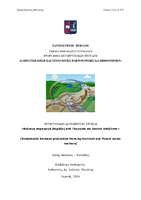| dc.contributor.advisor | Μανιάτης, Ιωάννης | |
| dc.contributor.author | Ζήσης, Νικόλαος Μιλτιάδης | |
| dc.date.accessioned | 2024-09-05T11:28:22Z | |
| dc.date.available | 2024-09-05T11:28:22Z | |
| dc.date.issued | 2024 | |
| dc.identifier.uri | https://dione.lib.unipi.gr/xmlui/handle/unipi/16714 | |
| dc.identifier.uri | http://dx.doi.org/10.26267/unipi_dione/4136 | |
| dc.description.abstract | Η ενεργειακή βιωσιμότητα έχει προσελκύσει μεγάλο ενδιαφέρον στον απόηχο της κλιματικής αλλαγής και η ενέργεια από βιομάζα βρίσκεται στην πρώτη γραμμή. Στο παρόν έγγραφο αξιολογείται η δυνατότητα της Ελλάδας, που είναι πλούσια σε φυσικούς πόρους, να βρεθεί στην πρώτη γραμμή στην παραγωγή ενέργειας από βιομάζα. Η ετήσια εκτίμηση του δυναμικού βιομάζας της Ελλάδας ανέρχεται σε 2,13 εκατομμύρια τόνους, κυρίως από τη γεωργία και τη δασοκομία, το οποίο μέχρι σήμερα δεν έχει αξιοποιηθεί στο μέγιστο βαθμό. Γεγονός που την τοποθετεί σε ιδιαίτερα ευνοϊκή θέση σε ευρωπαϊκό επίπεδο για την παραγωγή βιοενέργειας. Το πραγματικό ενεργειακό δυναμικό όλων αυτών των γεωργικών υπολειμμάτων βρίσκεται υπό μελέτη. Πιο συγκεκριμένα, αναλύεται η αποδοτικότητα στη διαδικασία μετατροπής και οι αντίστοιχες γεωγραφικές περιοχές κατανομής, με ιδιαίτερη έμφαση σε περιοχές με μεγάλη αφθονία βιομάζας, όπως η Κεντρική Μακεδονία, η Κρήτη και η Θεσσαλία. Επίσης, η παρούσα εργασία ερευνά τη σημασία που έχει η ανακύκλωση της βιομάζας με προέλευση από τα γεωργικά και δασικά απόβλητα καθώς στόχος αυτής είναι η διατήρηση και τη βιωσιμότητα του περιβάλλοντος. Διενεργεί έναν πλήρη έλεγχο για τις προκλήσεις που θέτει η κλιμάκωση της παραγωγής των αποβλήτων, τις σοβαρές επιπτώσεις που έχουν στο περιβάλλον και την υγεία του ανθρώπου και επιπλέον προτείνει ενδεχόμενες λύσεις για μια αποτελεσματική διαχείριση. Διότι η επιτυχής παραγωγή ενέργειας από βιομάζα είναι άρρηκτα συνδεδεμένη με τη συμπερίληψη βιώσιμων πρακτικών διαχείρισης αποβλήτων. Τέλος, αξιολογείται ο τρόπος με τον οποίο το σημερινό ελληνικό ρυθμιστικό πλαίσιο εντάσσεται στις οδηγίες της ΕΕ, ώστε η ελληνική βιομηχανία βιοενέργειας να εναρμονιστεί επαρκώς με τους γενικούς ευρωπαϊκούς στόχους για τις ανανεώσιμες πηγές ενέργειας. | el |
| dc.format.extent | 155 | el |
| dc.language.iso | el | el |
| dc.publisher | Πανεπιστήμιο Πειραιώς | el |
| dc.rights | Αναφορά Δημιουργού-Μη Εμπορική Χρήση-Όχι Παράγωγα Έργα 3.0 Ελλάδα | * |
| dc.rights | Αναφορά Δημιουργού-Μη Εμπορική Χρήση-Όχι Παράγωγα Έργα 3.0 Ελλάδα | * |
| dc.rights | Αναφορά Δημιουργού-Μη Εμπορική Χρήση-Όχι Παράγωγα Έργα 3.0 Ελλάδα | * |
| dc.rights.uri | http://creativecommons.org/licenses/by-nc-nd/3.0/gr/ | * |
| dc.title | Βιώσιμη παραγωγή βιομάζας από γεωργικά και δασικά απόβλητα | el |
| dc.title.alternative | Sustainable biomass production from agricultural and forest waste matters | el |
| dc.type | Master Thesis | el |
| dc.contributor.department | Σχολή Τεχνολογιών Πληροφορικής και Επικοινωνιών. Τμήμα Ψηφιακών Συστημάτων | el |
| dc.description.abstractEN | Energy sustainability has attracted much interest in the wake of climate change, and biomass energy is at the forefront. This paper assesses the potential for Greece, which is rich in natural resources, to be at the forefront of biomass energy production. Greece's annual biomass potential is estimated at 2.13 million tonnes, mainly from agriculture and forestry, which to date has not been fully exploited. This puts Greece in a particularly favourable position at European level for the production of bioenergy. The real energy potential of all these agricultural residues is currently being studied. More specifically, the efficiency in the conversion process and the corresponding geographical areas of distribution are analysed, with particular emphasis on regions with high biomass abundance, such as Central Macedonia, Crete and Thessaly. Also, this paper investigates the importance of recycling of biomass derived from agricultural and forestry waste as its aim is to preserve and sustain the environment. It conducts a comprehensive review on the challenges posed by the scaling up of waste production, its serious impacts on the environment and human health and further suggests possible solutions for an effective management. Because successful biomass energy production is inextricably linked to the inclusion of sustainable waste management practices. Finally, the way in which the current Greek regulatory framework is integrated with the EU directives is evaluated in order to ensure that the Greek bioenergy industry is adequately aligned with the general European renewable energy targets. | el |
| dc.contributor.master | Κλιματική Κρίση και Τεχνολογίες Πληροφορικής και Επικοινωνιών / MSc in Climate Crisis and Information and Communication Technologies | el |
| dc.subject.keyword | Biomass recycling | el |
| dc.subject.keyword | Agricultural waste | el |
| dc.subject.keyword | Forestry waste | el |
| dc.subject.keyword | Environment preservation | el |
| dc.subject.keyword | Sustainability | el |
| dc.subject.keyword | Waste production | el |
| dc.subject.keyword | Biomass energy | el |
| dc.subject.keyword | Greece | el |
| dc.subject.keyword | Climate change | el |
| dc.subject.keyword | Agricultural residues | el |
| dc.subject.keyword | Renewable energy policy | el |
| dc.subject.keyword | EU directives | el |
| dc.subject.keyword | Sustainable development | el |
| dc.subject.keyword | Energy economy | el |
| dc.date.defense | 2024-07-19 | |



